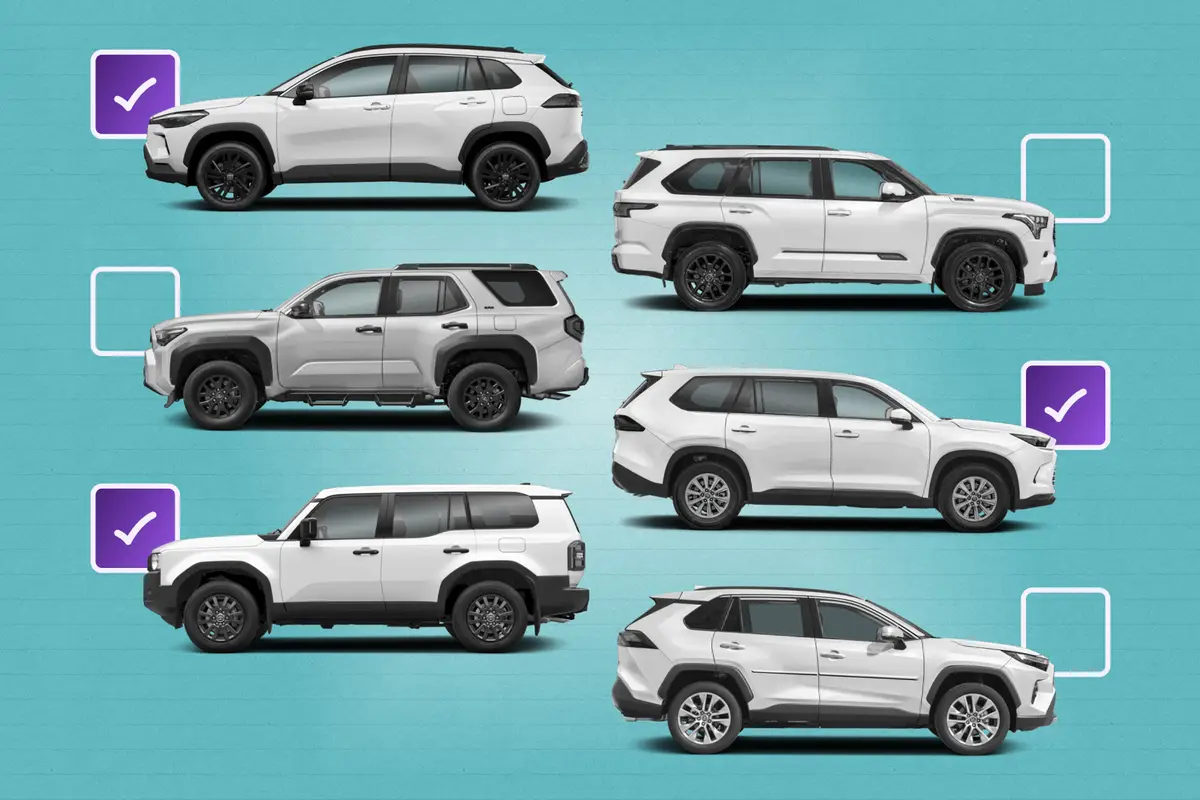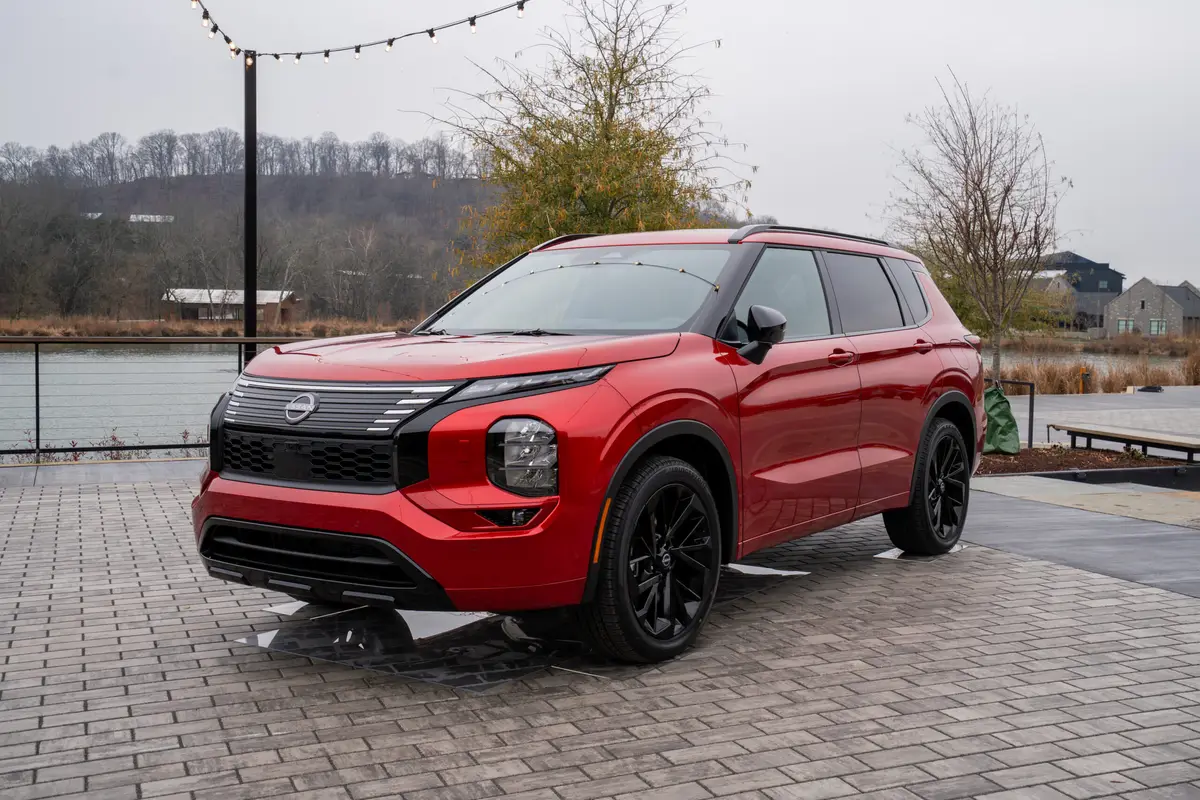2021 Hyundai Santa Fe Hybrid and 2022 Santa Fe Plug-In Hybrid Add Efficiency to Updated Santa Fe

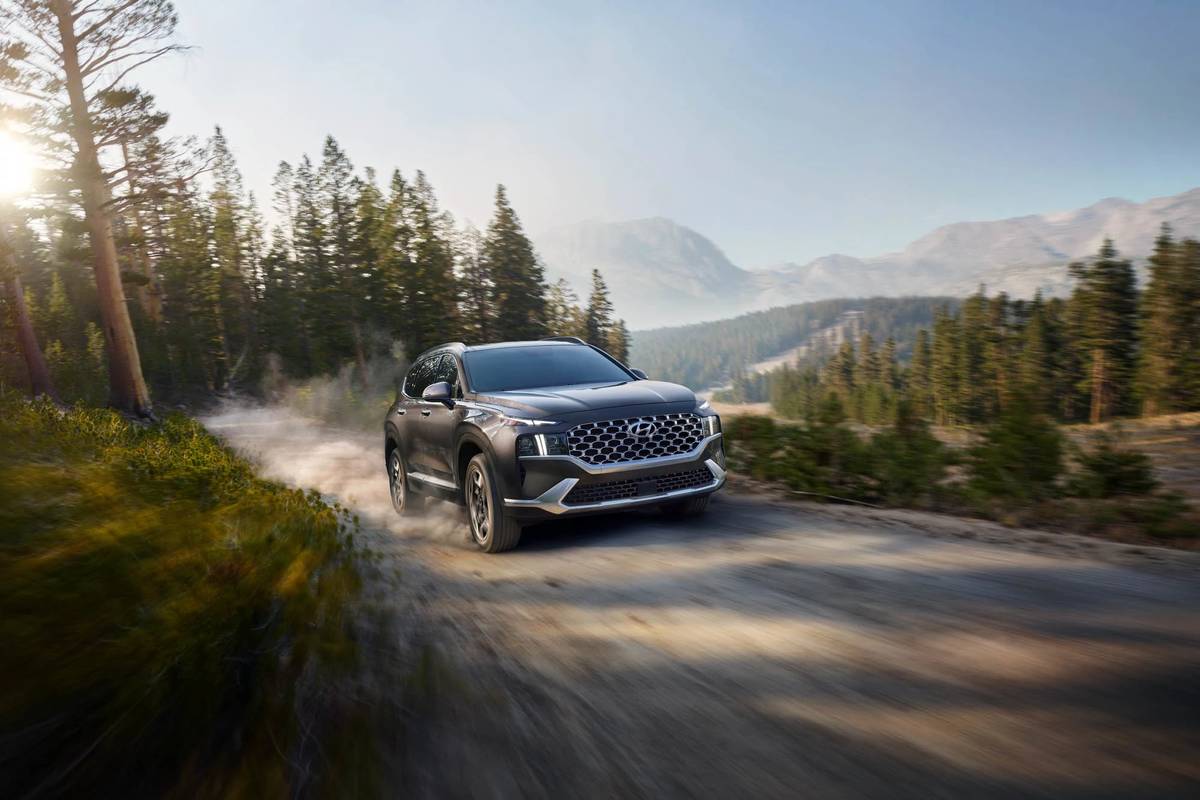
Competes with: Ford Escape Hybrid, Honda CR-V Hybrid, Toyota RAV4 Hybrid and RAV4 Prime, Toyota Venza
Looks like: The heavily updated 2021 Santa Fe mid-size SUV with tweaked badging
Powertrain: Turbocharged 1.6-liter four-cylinder and electric motor with estimated 226 (hybrid) or 260 (plug-in hybrid) combined horsepower; six-speed automatic transmission; all-wheel drive
Hits dealerships: Spring 2021 for hybrid, summer 2021 for plug-in hybrid
When we reported on the heavily updated 2021 Hyundai Santa Fe in late 2020, we mentioned upcoming hybrid and plug-in hybrid versions, though Hyundai provided few details at the time. Well, now we know a lot more.
Related: 2021 Hyundai Santa Fe Gets Palisade Makeover, Upgraded Engines and New Hybrid
- ${price_badge()}
- ${ami_badge()}
- ${battery_badge()}${ev_report_link()}
- ${hot_car_badge()}
- ${award_badge()}
- ${cpo_badge()}
${price_badge_description}
${ami_badge_description}
The EV Battery Rating is based on this vehicle's current expected range relative to the vehicles expected range when new. ${battery_badge_text}
This vehicle is certified pre-owned, backed by a manufacturer warranty, and typically undergoes a rigorous multi-point inspection to ensure quality and reliability.
This vehicle is currently in high demand given its competitive price, desirable features, and overall condition, and may have a higher chance of selling quickly.
Shop the 2021 Hyundai Santa Fe near you


The Santa Fe Hybrid will come as a late 2021 model, with the Santa Fe Plug-In Hybrid sold as a 2022 model. Aside from that distinction, along with their powertrains, little difference separates either model from the refreshed, gas-only 2021 Santa Fe. The Santa Fe Hybrid will come in Blue, SEL Premium and Limited trims. Meanwhile, the Santa Fe Plug-In Hybrid will be available in SEL Convenience or Limited trims.
Exterior and Interior
From outside, the main clue you’re looking at a Santa Fe Hybrid or Plug-In Hybrid is the badging, which is unique to these models. The Plug-In Hybrid will also have an extra filler door on the side opposite the fuel filler door, this one for its charging port.
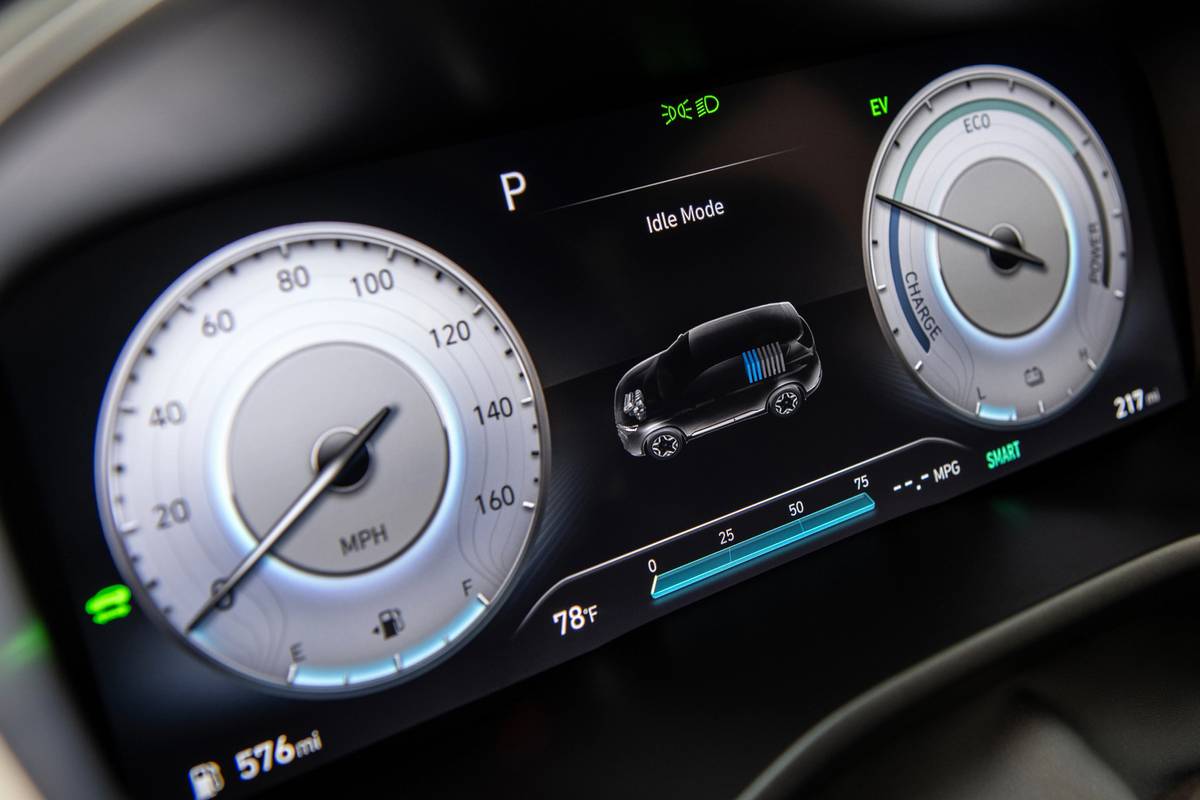
Inside, the digital instrument panel — standard on both hybrid variants but optional on the gas-only Santa Fe — will display a hybrid-specific power gauge but otherwise look and feel the same as a gas-only Santa Fe. While Hyundai does offer solar-roof technology in the Sonata Hybrid, it eschewed that here in favor of a traditional panoramic moonroof, something the automaker believes buyers will prefer.
Efficiency Under the Hood
The main changes to the Santa Fe Hybrid and Plug-In Hybrid happen under the hood. Both models use a gas-powered turbocharged 1.6-liter four-cylinder, a six-speed automatic transmission and standard all-wheel drive. The AWD comes by way of Hyundai’s HTrac system, not one where separate motors power the rear wheels.
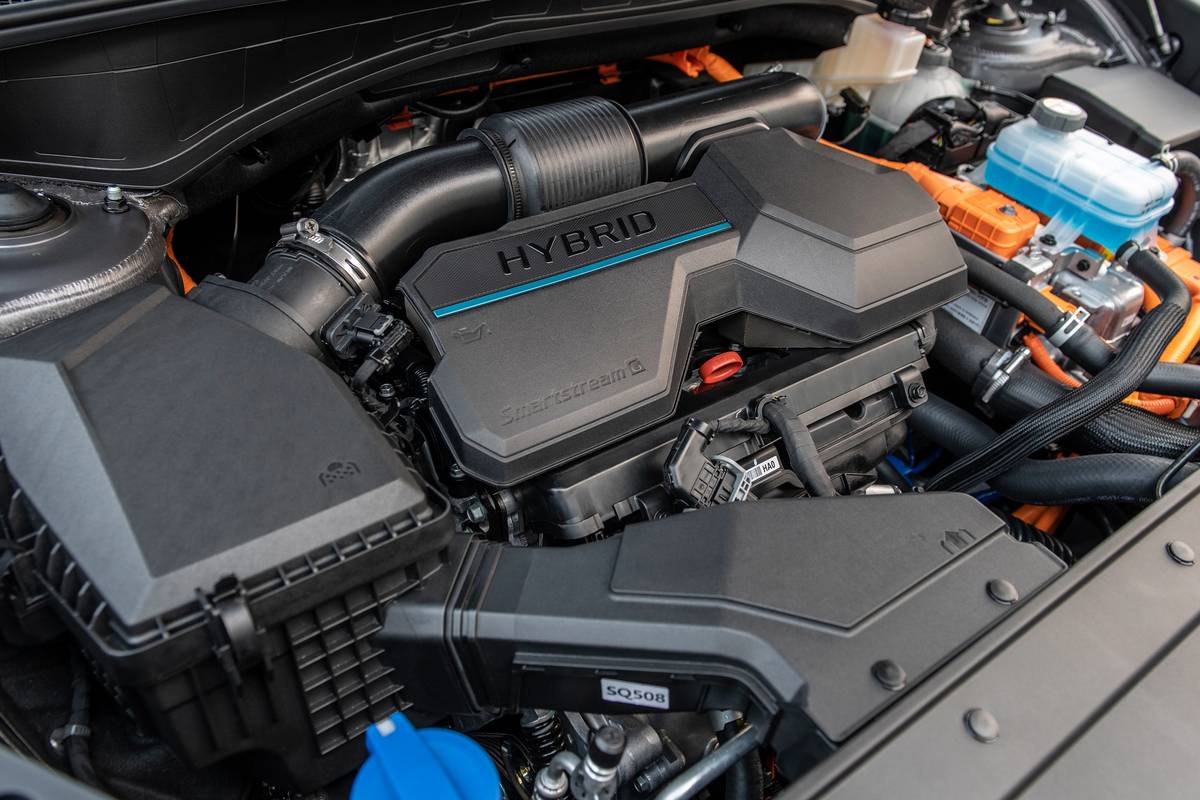
The Santa Fe Hybrid pairs its gasoline engine with a 60-horsepower electric motor running off a 1.5-kilowatt-hour lithium-ion battery pack, and Hyundai estimates the entire system produces 226 hp total. EPA estimates for the 2021 hybrid are 32 to 34 mpg combined, depending on trim. So the hybrid leads the gas-only Santa Fe AWD by up to 10 mpg, or roughly 40%.
The 2022 Santa Fe Plug-In Hybrid uses a more powerful electric motor (90 hp) and larger battery pack (13.8 kWh) for 260 combined hp, according to Hyundai’s estimates. Internal estimates anticipate a max 33 mpg combined, 30 miles of all-electric range and a total rating of 76 mpg-equivalent.
Both ratings trail those of the Toyota RAV4 Hybrid and Prime, respectively, and the Santa Fe Hybrid is also rated lower than either the Honda CR-V Hybrid or Toyota Venza. The Santa Fe Hybrid is, however, a larger vehicle than those compact SUVs.
Hyundai thinks shoppers tend to compare hybrids and plug-in hybrids by powertrain, not vehicle class, so these comparisons do make some sense — especially given that the starting price for the gas-only Santa Fe is only a little higher than the popular Honda and Toyota SUVs. Perhaps the combination of in-between size and efficiency for Hyundai’s hybrid and plug-in Santa Fe variants, relative to other SUVs of such ilk, will appeal to shoppers.
Standard Safety Tech
Both Santa Fe models will come standard with Hyundai’s SmartSense suite of advanced safety features, including forward collision warning with automatic emergency braking and pedestrian and cyclist detection, blind spot warning with collision avoidance assist and rear cross-traffic alert, and lane-centering steering. The Limited grades offer more advanced features, like Hyundai’s blind spot cameras and remote parking assist.
Pricing and Release Date
Pricing will come closer to the vehicles’ on-sale dates — spring 2021 for the Santa Fe Hybrid, summer 2021 for the Santa Fe Plug-In Hybrid — though expect the hybrid to cost more than an equivalent gas-only Santa Fe and the plug-in to cost even more. Given its battery capacity, the latter should have a considerable offset from federal tax credits for plug-in vehicles.
Cars.com’s Editorial department is your source for automotive news and reviews. In line with Cars.com’s long-standing ethics policy, editors and reviewers don’t accept gifts or free trips from automakers. The Editorial department is independent of Cars.com’s advertising, sales and sponsored content departments.

Road Test Editor Brian Normile joined the automotive industry and Cars.com in 2013, and he became part of the Editorial staff in 2014. Brian spent his childhood devouring every car magazine he got his hands on — not literally, eventually — and now reviews and tests vehicles to help consumers make informed choices. Someday, Brian hopes to learn what to do with his hands when he’s reviewing a car on camera. He would daily-drive an Alfa Romeo 4C if he could.
Featured stories
